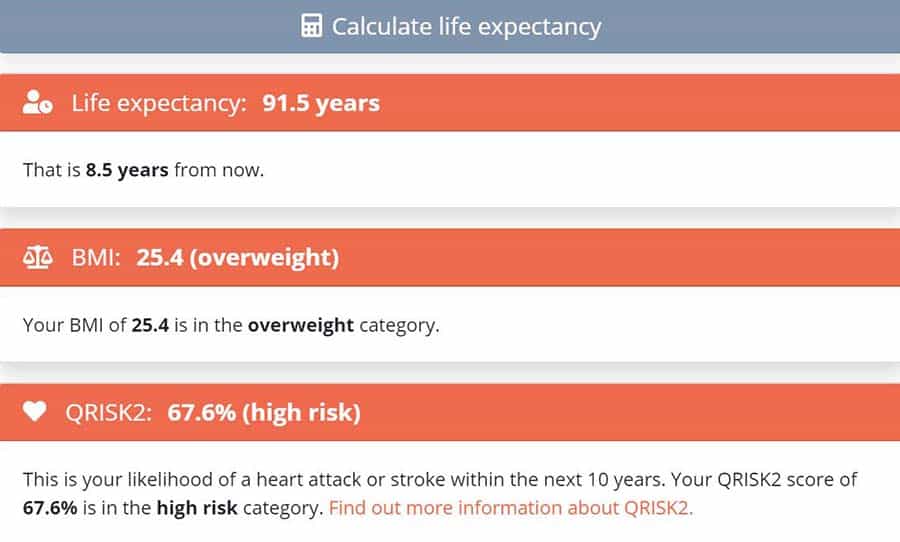App developed that forecasts life expectancy and risk of heart attack or stroke for those aged 60+
Researchers from the University of East Anglia (UEA) have created a new app that evaluates the effect of various medical and lifestyle factors to provide a forecast of life expectancy.
Called ‘Mylongevity’, the app uses big data from anonymised electronic health records to calculate life expectancy – taking into account sociodemographic and health characteristics such as chronic diseases.
According to researchers, the app could help bring practical, financial and medical benefits to users – such as helping people plan for retirement.
Lead researcher Prof Elena Kulinskaya, from UEA’s School of Computing Sciences, said: “People are interested in their life expectancy, but it is not just out of morbid curiosity.
“Life expectancy is a big consideration in any long-term planning and it is especially important to people planning their financial goals and retirement strategies.
“It can also help people improve their life expectancy by making healthy lifestyle changes.”
In particular, the UEA team suggest the app can be used to highlight how behaviours such as smoking can affect longevity, helping GPs to highlight the importance of making lifestyle changes to patients.
The calculations are based on UK life expectancy figures published by the Office for National Statistics, which have been refined using UEA research on cardiovascular disease and the benefits of statin use.
“We have identified and quantified the key factors affecting mortality and longevity, such as lifestyle choices, medical conditions and medical interventions,” explained Prof Kulinskaya.
“The software we have developed is based on our research using electronic health records. In our recent analysis of life expectancy, we followed a cohort of 110,000 healthy people who hit 60 between 1990 and 2000 for the next 25 years, updating their health status every six months.”
Prof Kulinskaya pointed out that the research only included people aged 60 and older who resided in England and Wales. For those younger than 60 years old, the life expectancy forecast is provided assuming that the user survives to age 60 with no changes to their current demographic and health characteristics.
“The results of our analysis are translated into life expectancies for 648 different risk profiles based on age, sex and postcode,” she continued.
“The list of risk factors we used include hypertension, diabetes, hypercholesterolemia, BMI, the risk of a cardiac event within 10 years, smoking status and statin use.”
As well as forecasting longevity, the app also highlights a user’s risk of a heart attack or stroke within the next 10 years.
“This research provides a calculation of life expectancy at a very fine scale,” confirmed Prof Kulinskaya.
Importantly, the UEA research team emphasise that the result is by no means an individual prediction, citing the variation in individual longevity, however, may give users “some useful food for thought.”
Discussing the impact of the coronavirus, Prof Kulinskaya added: “Unfortunately the Covid-19 pandemic may result in a decreased life expectancy for some.
“We are confident that the key application of our tool – helping to show the relative effects of such things as smoking – is largely unaffected, but we plan to fine tune it to explore life expectancy changes caused by the pandemic.”
The research was based on the results of a research programme on ‘Big Health and Actuarial Data for understanding Longevity and Morbidity Risks’ funded by the Institute and Faculty of Actuaries (IFoA) and commissioned through its Actuarial Research Centre (ARC). The development of the Mylongevity App was funded by UEA.
The app can be assessed at https://mylongevity.org/
https://thiis.co.uk/app-developed-that-forecasts-life-expectancy-and-risk-of-heart-attack-or-stroke-for-those-aged-60/https://thiis.co.uk/wp-content/uploads/2020/09/man-sat-on-bench-looking-at-laptop.jpghttps://thiis.co.uk/wp-content/uploads/2020/09/man-sat-on-bench-looking-at-laptop-150x150.jpgNewsroomReports & ResearchSector Newsapp,BMI,cardiovascular disease,diabetes,heart attack,hypercholesterolemia,hypertension,life expectancy,Mylongevity,Office for National Statistics,Prof Elena Kulinskaya,stroke,University of East AngliaResearchers from the University of East Anglia (UEA) have created a new app that evaluates the effect of various medical and lifestyle factors to provide a forecast of life expectancy. Called ‘Mylongevity’, the app uses big data from anonymised electronic health records to calculate life expectancy – taking into account...Calvin BarnettCalvin Barnettcalvin.barnett@bhta.comAuthorTHIIS Magazine



